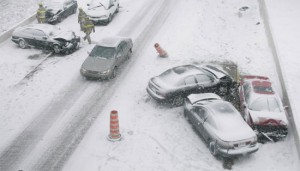Get Home for the Holidays: Tips to Avoid Road Accidents for the Winter Traveler
The holiday season is a wonderful time for many people to take vacations and visit their family friends. It is also a time where cars slide on the ice, drivers drink too much egg nog, and shopping frenzies cause insurance-raising fender benders. Here are some pointers to keep you and your kin safe and out of trouble on the way to your destination.
1. Prepare for driving through the ice and drifting snow
Winter driving requires patience, skill, and knowing when to pull over. One University of Georgia researcher, Alan Black, analyzed ten years of recent weather data to show that 800 drivers die each year just by driving in inclement winter weather such as sleet, snow, and freezing rain. This type of weather also causes well over a million accidents every year. 
Insurance experts and state agencies have compiled many lists of winter driving tips, and here are a few that stand out:
- Have emergency equipment including jumper cables, a shovel, a scraper/brush, snow chains, and sand in your car. If you are planning a long-distance trip that could leave you stranded, also pack flashlights, food, blankets, warm clothing, and other winter gear.
- Keep your cellular phone charged.
- Winterize the car, making sure that your windshield wipers, battery, and tires are in good repair and that you have plenty of antifreeze in the system.
- Learn how your car’s brake system works and how to react if tires start to slide on the ice.
- Don’t take unnecessary drives in terrible weather.
- When on the road, increase the distance between other cars.
- Use headlights for visibility, but do not use high beams in snow, fog, or heavy rain.
2. Don’t cancel out Black Friday deals by increasing your insurance bill
Tens of millions of shoppers attend Black Friday sales, and they are starting earlier and earlier, creeping into Thanksgiving evening. Often, cars file in and out of cramped parking lots. Progressive Insurance discovered that parking lot claims rose by 36% on Black Friday in 2011. Unfortunately, there hasn’t been a more recent study, but drivers should still be careful. Here, the advice is simple:
- Stay patient and calm.
- Use your signals.
- Choose parking spots where you have high side and rear visibility.
- Look carefully before you pull in/out of a parking spot
3. Don’t drive intoxicated after a holiday party unless you want a DUI…or worse
Each year, “Blackout Wednesday” packs the local bars and kicks off the holiday season as one of the biggest binge-drinking days of the year. The frequency crashes involving alcohol during the holidays in general is 2-3 times higher than during the rest of the year. In all, 40% of holiday crashes involve alcohol. Bad road conditions combine with drivers’ diminished control of vehicles and poor reaction time produce serious and sometimes deadly accidents. Knowing this, the police and their DUI/DWI patrols are often poised to catch drivers in the act. Here are tips to avoid the ultimate holiday calamity:
- Plan for yourself and your holiday elves… designate a driver at the beginning of the evening, have the number of a reliable cab, and don’t leave your car somewhere it can’t stay overnight. Make sure your friends also have a plan.
- Nothing can really “sober” you up except for time. If you’ve had an intoxicant, coffee, water, or pumpkin pie may make you feel good, but won’t make you immediately fit to drive.
- Beware driving applications (“apps”) that claim to help. Breathalyzer applications can be inaccurate, and so can applications that say they can track DUI checkpoints. If you want guaranteed protection from a DUI, don’t drink or use other intoxicating substances before you drive.
- Know the DUI laws in your state. In some states, a DUI only requires “physical control” over a vehicle. For example, a person can be asleep in the backseat with keys in their pocket and still technically have “physical control” over the car. States may also criminalize reckless alcohol-related driving even for a driver who tests below the legal blood alcohol limit.
- In most states, the blood alcohol limit is .08; one strong drink may put a petite person over the line. Factors including metabolism, fatigue, and how much you’ve had to eat can play a role in blood alcohol level. Once again, there’s only one way to make sure you’ll be safe: don’t mix driving with intoxicating “holiday cheer.”
Happy Holidays, and stay safe!

Comments